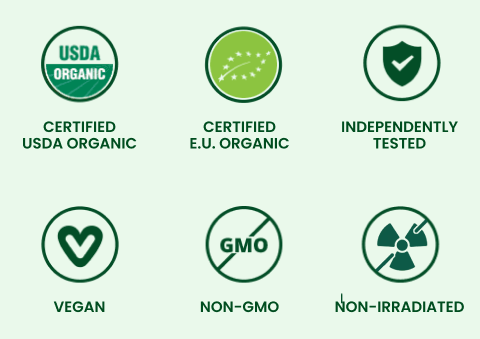Nowadays, walking down the wellness aisle can feel entirely overwhelming. You’re bombarded with tubs and bags of powders, all promising to help you feel or look your best. Two of the heaviest hitters in this green new world are Moringa and Maca. They sit there, side-by-side, looking deceptively similar, both touted as superfoods.
Buy which one is actually worth your money? Which one will make a real difference to your energy, immunity, and sanity?
We’ve been there, staring at those two tubs. We’ve gone down the rabbit hole, done the research, and put them both to the test in our own daily routines. While both are incredible plants, let's take a look at which one offers more bang for your buck for long-term, everyday wellness.
Quick Look: Moringa vs. Maca
For those who just want the cheat sheet, here’s the high-level breakdown.
Getting to Know Our Contenders
Moringa: The Overachieving Leaf from the "Miracle Tree"
First up is Moringa. Forget exotic, this is just a humble tree, Moringa oleifera, that happens to be one of the most generous plants on earth. For centuries, it's been called the "Miracle Tree" in places like India and Africa, because nearly every part of it is useful. The powder we use is simply its leaves, dried and ground into a fine, vibrand powder.
There's no fancy extraction process, no secret formula. Its magic is simply in its incredible density of nutrition.
The taste? Look, it’s not trying to be a sweet treat. Moringa powder is unapologetically green. It tastes earthy, a bit like spinach with the intensity of matcha. While some people find it a bit strong, it vanishes beautifully into savory things like soups, curries, dips, or can be tamed in a smoothie with pineapple or banana.
Maca: The Tough-as-Nails Root from the Mountaintops
Now, let's jet over to the Andes Mountains. Picture a windswept plateau, 13,000 feet up, where the air is thin and the weather is brutal. That’s where Maca, a rugged little root vegetable, chooses to live. As a cousin to broccoli and cauliflower, this plant has to be tough to survive, and it seems to pass that resilience on.
Peruvians have revered it for millennia, not just as food, but as a source of ancient energy and vitality. The powder is made from its dried root.
The taste? This is where Maca wins over a lot of people. It’s got a surprisingly pleasant, malty sweetness to it. Think earthy butterscotch or caramel. This makes it a total natural for adding to coffee (hello, Maca latte!), oatmeal, protein shakes, and even baked goods.
What's Actually Inside?
This is where the two start to differ dramatically. A quick look at their nutritional labels tells two very different stories.
Moringa’s whole game is about is a nutritional powerhouse that tries to give you a little bit of everything you need. Think of it as nature’s multivitamin. It's packed with:
-
Vitamins A and C: Seriously loaded. We're talking immune-system-fortifying, skin-glowing levels.
-
Essential Minerals: Moringa is a fantastic plant-based source of iron and calcium—two minerals that many people, especially women, are low in. It actually has more iron than spinach and more calcium than milk, gram for gram.
-
Complete Plant Protein: This is a big one. Moringa contains all nine essential amino acids, making it a complete protein. That’s a rare and valuable thing in the plant world.
-
Antioxidants: It’s brimming with compounds like quercetin and chlorogenic acid that help your body fight off stress and inflammation.
Maca isn’t trying to be a jack-of-all-trades. Its value isn't in a long list of vitamins, but in its unique, active compounds that you won't find anywhere else. It’s a specialist.
-
Adaptogenic Compounds: Maca’s superpowers come from exclusive alkaloids called macamides and macaenes. These are what make it a true adaptogen—a substance that helps your body "adapt" to physical and mental stressors, especially by supporting your endocrine (hormone) system.
-
Targeted Minerals: It’s a solid source of copper and manganese, but it's not going to fill major nutritional gaps in your diet.
-
Glucosinolates: Being in the broccoli family, it has those sulfur-rich compounds that have been heavily researched for their protective benefits.
The Bottom Line on Nutrition: If your diet is already perfect, maybe Maca is for you. But for the rest of us living in the real world, Moringa offers a much-needed nutritional safety net, covering a huge range of bases in a single scoop.
Okay, But How Will I Feel?
This is the most important question, right? Here’s how their strengths play out in real life.
Energy & Stamina
Maca is famous here. People love it as a pre-workout or a coffee alternative because it gives you a noticeable lift in energy and stamina without the caffeine jitters. It works by nourishing your adrenals, not just stimulating them. It's a clean, sustained energy.
Moringa’s approach to energy is more foundational. It’s not a quick jolt but rather a slow burn. It works by tackling the root causes of fatigue, like low iron levels. By giving your body the actual building blocks it needs for its energy-production cycles, it helps you build a more resilient, stable energy reserve over time.
Hormones & Libido
Let’s give credit where it's due: Maca is the undisputed champion of the endocrine system. For centuries, it’s been used to boost libido and support fertility. Modern users, particularly women navigating menopause, often swear by it for easing hot flashes and mood swings. This is its specific, targeted superpower.
Immunity & Inflammation
This is where Moringa truly shines and, for us, pulls ahead for overall health. We live in a world that promotes chronic inflammation - the silent, low-grade fire that contributes to almost every major health issue. Moringa is an anti-inflammatory powerhouse. Its combination of Vitamin C, Vitamin A, and unique compounds like isothiocyanates makes it an incredible daily defender for your body, helping to calm inflammation and keep your immune system sharp and ready. Maca has some antioxidants, but it’s not in the same league as Moringa on this front.
That "Lit-From-Within" Glow
Want healthier skin and hair? You need the nutrients that build them. Moringa’s cocktail of antioxidants, Vitamin A (for cell turnover), and Vitamin C (for collagen synthesis) is basically a recipe for glowing skin, from the inside out.
The Final Verdict: Which One Sits on Our Counters?
So, after all this, which powder gets the prime spot in our kitchens?
If you are wrestling with a specific issue like low libido, or if you want a clean, adaptogenic boost for your workouts, Maca is a fantastic, targeted tool.
But if we had to recommend just one powder for almost everyone, it would be Moringa, hands down.
Here's why: Moringa is playing the long game. It’s not about a quick fix; it’s about foundational care. While Maca addresses specific symptoms, Moringa nourishes the entire system. It fills the nutritional gaps that are so common in our modern diets, tackles the chronic inflammation that underpins so many health problems, and provides the raw materials for sustained energy and a strong immune system.
For us, it’s the smarter, more versatile investment in long-term health. It’s the one that ensures your body has what it needs to thrive every single day, not just when it needs a temporary boost. In the showdown between the specialist and the all-rounder, the all-rounder that builds a stronger foundation wins our vote every time.


